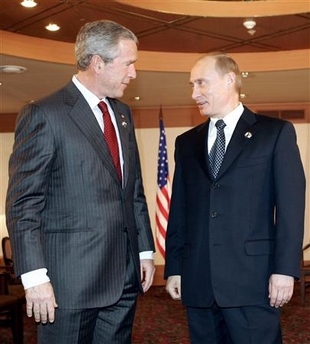US mulls nuclear cooperation agreement with Russia
(Reuters)
Updated: 2006-04-28 06:35
WASHINGTON - The United States is discussing the possibility of a
civilian nuclear energy agreement with Russia that could help wean Moscow away
from cooperation with Iran, according to U.S. officials.
|
 |
|
A 2005 file
photo showing President Bush (L) and Russian President Vladimir Putin in
Pusan, South Korea November 18, 2005. The United States is discussing the
possibility of a civilian nuclear energy agreement with Russia that could
help wean Moscow away from cooperation with Iran, according to U.S.
officials. [Reuters] | The move comes as Western powers are increasingly alarmed about what they say
is Iran's determination to produce nuclear weapons.
Diplomatic efforts to persuade Tehran to reverse course so far have been
frustrated, in part because of U.S. and allied differences with Russia, the only
major power still engaging in lucrative nuclear cooperation with the Islamic
republic.
In recent interviews, several U.S. officials said a possible nuclear energy
accord with Moscow is under review. They spoke anonymously because the issue is
sensitive and no final decision has been made.
Such an agreement would be a significant change in U.S. policy, which now
prohibits most nuclear cooperation with Russia because of Moscow's pivotal role
in building Iran's $800 million nuclear power plant at Bushehr.
A cooperation agreement is "something that we're actively evaluating" and
have discussed with the Russians over the past two months, one official told
Reuters.
"It would provide a foundation for greater (U.S.-Russia) cooperation but
doesn't commit the sides to any particular project and could be a way of
demonstrating to the Russians how much larger our market is than what exists in
Iran," he added.
Russia has long defended its nuclear cooperation and conventional arms sales
to Iran as a critical revenue source.
RUSSIA COMMITTED TO BUSHEHR
U.S. officials have intensified efforts to get Moscow to end both pursuits to
penalize Iran for defying the security council, which has demanded Tehran halt
uranium enrichment activities.
Mohamed ElBaradei, chief of the U.N. International Atomic Energy Agency, is
widely expected to report to the security council on Friday that Tehran has not
met the U.N. demands. Iran insists it only wants to produce energy, not weapons.
|